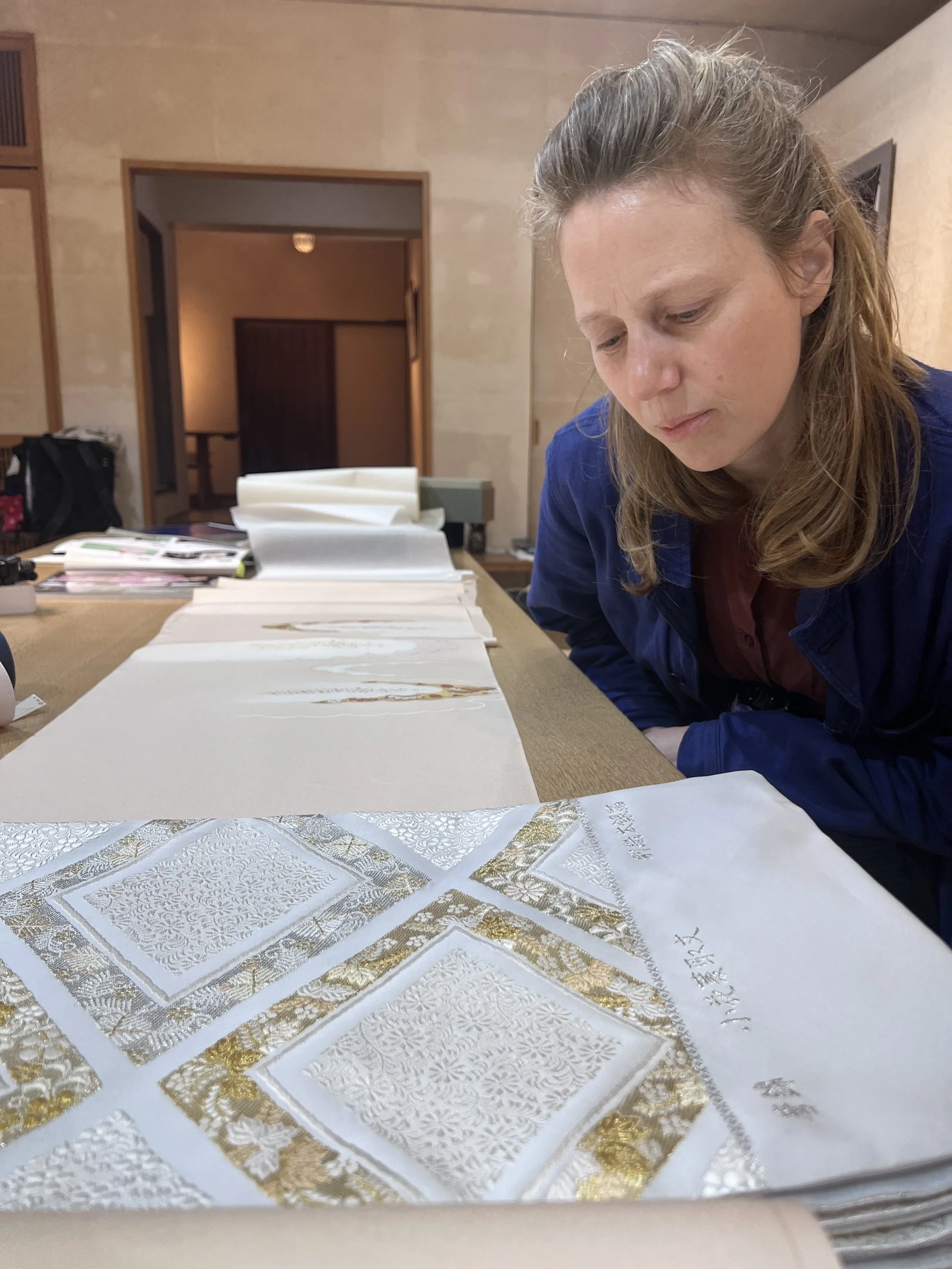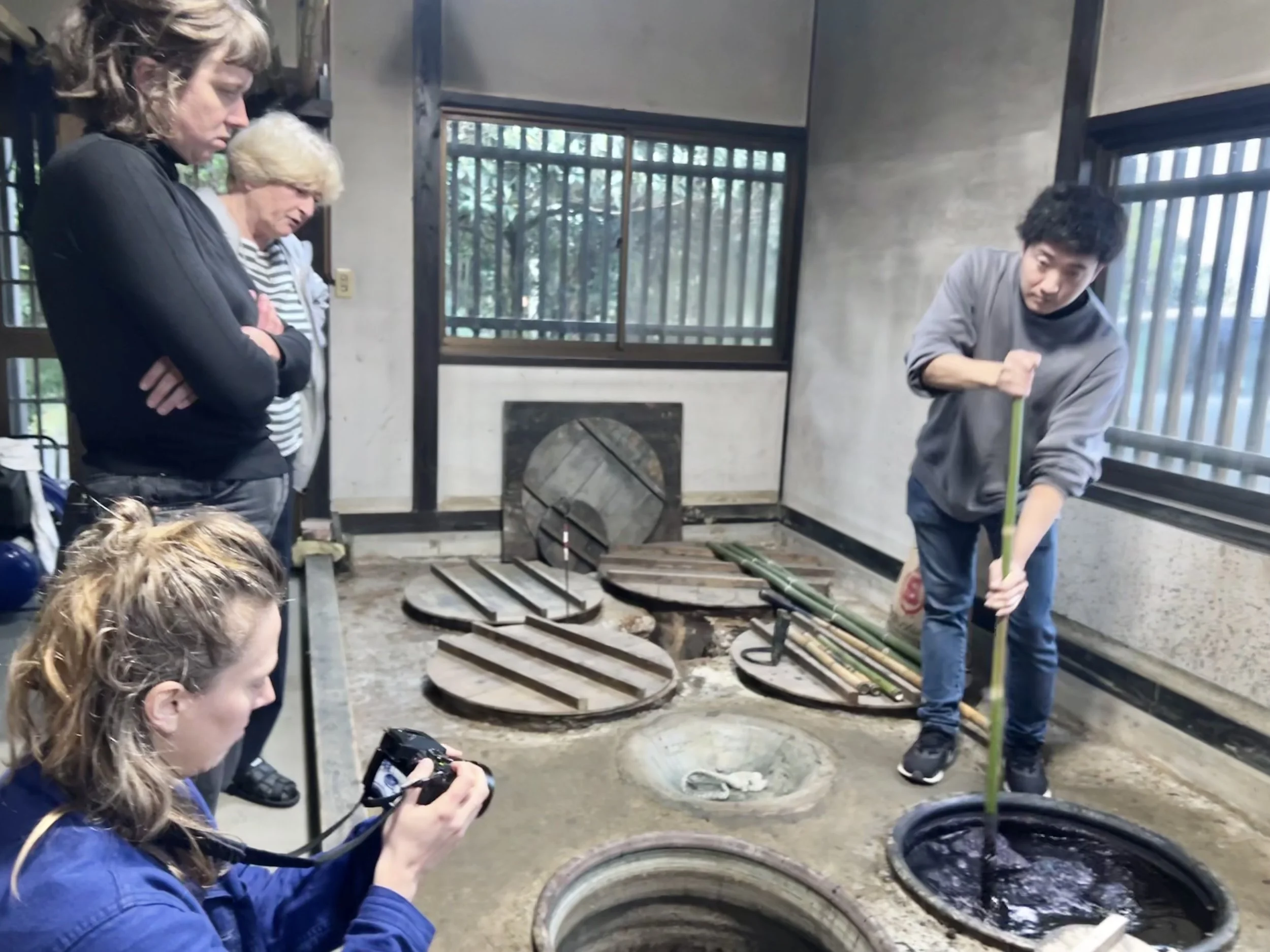Aliki van der Kruijs | Céline Pelcé
Aliki van der Kruijs
textile
Apr 2024
Netherlands
https://www.alikivanderkruijs.com/wp/
Céline Pelcé
food art
Apr 2024
France
アリキ・ファンデルクルイ
テキスタイル作家、自然現象x造形
2024年3-4月
オランダ
セリーヌ・ペルシェ
食文化 x アート
2024年3-4月
フランス
Aliki とうきはのつながり、アートを通じた循環の創出
オランダ人アーティスト Aliki van der Kruijs がうきはと出会ったきっかけは、2016年に参加した 「Crafts Council Netherlands」 のプログラムでした。これは、日蘭交流記念事業『Holland x Kyushu 2016–17』の一環として、オランダ政府と九州の連携拠点により実施されたプロジェクトで、4名のアーティストが福岡県の染色・テキスタイル工房を訪れ、技術を学び、自らの作品へと昇華するというものでした。
このプログラムの企画・運営は Crafts Council 創設者である Marion Poortvliet によって行われ、Omnicent の馬場亮子はその企画段階のリサーチをサポートしていました。
Aliki はこのプログラムを通して、佐賀県有田の窯元や福岡県内の織元とつながり、帰国後も丁寧なやり取りを続けてきました。
とりわけ、久留米市で藍染と久留米絣の伝統を守り続ける 松枝家 との交流は深く、家族ぐるみの関係となり、来日のたびに松枝家を訪れるようになりました。
そうした縁を経て、Aliki は「今度はアーティストとしてうきはに滞在したい」という思いを強め、数年越しの構想と Omnicent との協議を経て、フランス人アーティストの Celine Perche とユニットを組み、ついに来日を果たしました。
Winnie、Celineとの交差、共同体験としての滞在
滞在期間中は、すでにうきはに滞在していたオランダ人ガラス作家 Winnie とも訪問先が重なり、工房訪問やアーティストトークなどのプログラムを3人で共に実施しました。
Alikiは自然現象や気象、生き物の動きにインスピレーションを得てデザインするテキスタイルアーティスト。
一方の Celine は、食文化を軸とした身体表現や思索を行うアーティストです。
そのため、Omnicent での滞在プログラムは「食」と「染色、織物」というふたつのテーマに焦点が当てられました。
たとえば、野草に詳しい地元の方と一緒に山を歩いて野草を摘み、それを料理する体験や、地域の豆腐職人から水や土壌の話を聞きながら出来立ての豆腐を味わう場などを設けました。
さらに、職人がつくった豆腐を藍染の工房に持ち込み、植物染料である藍を使って豆腐を「染めてみる」というユニークな実験的コラボレーションも行われました。
土地の記憶を記録し、共有するために
Aliki と Celine は、こうした自然との関わりの中で生まれる工芸と、土地の恵みを口にする食文化とを、ひとつの流れとして捉え、記録と創作を続けました。
3週間のうきは滞在を終えた二人は、その後、徳島県の神山町などを経て京都へ。
日本滞在の締めくくりとして、京都でこの記録と物語を「参加型パフォーマンス」として発表する計画を立てました。
Omnicentが目指す、うきはを起点としたアートの循環
Omnicent ではこのように、海外アーティストの滞在を通じて地域と世界をつなぐプロジェクトを継続しています。
今後は、オランダ・イタリア・フランスなどの土地で、滞在アーティストたちと共同でイベントを企画・開催し、
うきはでの経験から生まれたアート作品やコラボレーションを海外で発表していく予定です。
日本の工芸や文化を担う作家たちの表現が、海外アーティストの感性と交差し、別の土地で再びかたちを変えて表現されていく──
そんな「うきは発」の創造の循環を、今後も育てていきたいと考えています。
A Creative Connection Across Cultures
Dutch artist Aliki van der Kruijs first encountered Ukiha in 2016, through her participation in a program by the Crafts Council Netherlands.
As part of the Holland x Kyushu 2016–17 cultural exchange project—organized in collaboration with the Dutch government and regional partners in Japan—four Dutch artists were invited to visit dyeing and textile workshops across Fukuoka Prefecture. The initiative was curated by Marion Poortvliet, founder of the Crafts Council Netherlands, with research support from Ryoko Baba of Omnicent.
During this time, Aliki established lasting relationships with various artisans, including porcelain makers in Arita (Saga Prefecture) and traditional textile workshops throughout Fukuoka.
One of her closest and most enduring connections was with the Matsueda family, renowned for preserving the traditional indigo dyeing and Kurume Kasuri weaving techniques in nearby Kurume City. Over the years, she continued to deepen this friendship and visited the family during her subsequent trips to Japan.
Her desire to return as an artist-in-residence eventually led her to Omnicent. After several years of discussions, she finally realized her plan—this time in collaboration with French artist Celine Perche, forming an artist duo for their visit to Japan.
Crossing Paths with Fellow Artists: A Shared Residency
Their residency coincided with the stay of Dutch glass artist Winnie, who was also in Ukiha during that period.
The three artists shared visits to workshops and participated together in artist talks and cultural exchanges, enriching each other’s experiences.
Aliki specializes in textiles and creates works inspired by natural elements such as weather patterns and insect behavior.
Celine, on the other hand, is an artist focused on food, exploring it as a medium for philosophical and performative expression.
Given their unique interests, the residency program at Omnicent was tailored to highlight themes of food and natural dyeing.
They joined local women with deep knowledge of edible wild plants for foraging and cooking sessions, and visited a tofu artisan to learn about water, soil, and the local ecology behind his craft—followed, of course, by tasting freshly made tofu.
In one experiment, they even brought that tofu to a natural indigo dye studio, where they attempted to dye it using the same plant-based techniques used for fabric.
This playful and poetic crossing of boundaries between food and craft became one of the highlights of their stay.
A Journey of Craft, Soil, and Storytelling
Throughout their time in Ukiha, Aliki and Celine sought to document the interplay between craft traditions born from the land and the food culture nourished by that same earth and water.
Their approach was not simply observational—it was participatory, sensorial, and reflective.
After spending three weeks in Ukiha, the duo continued their journey through Japan, including stops in Kamiyama (Tokushima Prefecture) and Kyoto, where they planned to present their experience as a participatory performance—transforming research and lived encounters into public expression.
Omnicent’s Vision: Art, Circulation, and Collaboration
At Omnicent, we view residencies not as isolated experiences but as the seeds of an ongoing cultural ecosystem.
We aim to follow up on these exchanges by hosting collaborative events abroad—in the Netherlands, Italy, France, and beyond—sharing the work of Japanese artisans and co-created projects with wider international audiences.
We envision a cycle in which encounters in Ukiha become art,
art becomes connection,
and connection leads to new expressions—
all grounded in the people, land, and culture of this unique region.
Aliki BIO
https://www.alikivanderkruijs.com/wp/
Aliki van der Kruijs is a textile designer and researcher. She questions and visualises the relationship between the natural world, colour and space, with a strong focus on material narratives. Her textile and spatial works are relational to time, place and landscape. The weather and geology, water and its cycles are the elements in almost all her projects.
Her practice is based on an intuitive encounter with the world through fieldwork. Many of her projects originated on or in response to a location, phenomena, natural (re)sources or a specific technique with a strong sense of coloring processes.
In her visual grammar space is created in which natural elements such as rain, the sun, heat or soil edit material and generate meaning. The works can be seen as publications about her continuous explorations to the living library of Earth and the material and spiritual culture of its inhabitants.
After finishing her master’s in applied art at the Sandberg Institute, she established her own studio in 2012. She often initiates research projects and collaborations herself, the results of which are shown in the Netherlands and abroad.
In 2020-2021, she took part in the residency program at the Jan van Eyck Academie, an international post-academic institute for visual arts, design and reflection in Maastricht.
Aliki is an alumni from the Jan van Eyck Academie in Maastricht. She graduated with a MA in Applied Art at the Sandberg Instituut and a BA in fashion design from the ArtEZ University of Arts.
She collaborates with fashion designers and architects to apply her materials and worked with companies and institutes like Nike, Wolf-Gordon, Zig Zag Zurich, Sandberg Instituut, Het Nieuwe Instituut as well. She was part of the Weavers Werkstatt, a project by Jongeriuslab. For further information or request for collaboration feel free to contact:
Celine BIO
https://celinepelce.fr/
As a designer and artist, Céline Pelcé adresses the edible material as a poetic and political soft power, a narrative and experiential agent. Implanting her work in different geographical territories, she explores the boundary zones between the societal and natural worlds, culinary and agricultural rituals, searching for the human being's ecosystemic, interdependent identity.
Céline Pelcé shares these narratives through meals, sculptures and culinary performances, which she creates in collaboration with chefs, artisans, botanists… Working primarily in cultural and artistic environments, her work also takes place in events, educational and health related projects.
With a background in space design (Ecole Boulle, France) and food design (ESAD de Reims, France), she has been working in a nomadic dynamic since 2020, having collaborated with the Jan Van Eyck Academy foodlab (NL), worked on projects for socio-ecological transition in Montréal (CA) and resided at Villa Kujoyama (JP), among others.


